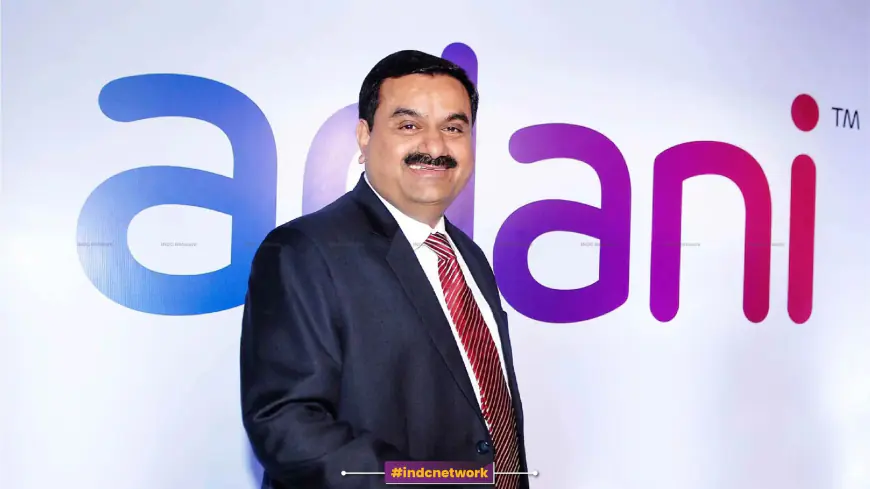Introduction : Gautam Adani, the founder and chairman of the Adani Group, is one of the most significant figures in India’s business world. His story is one of ambition, resilience, and relentless pursuit of growth, leading to the creation of one of the largest and most diverse business conglomerates in India. From modest beginnings in Gujarat, Adani's empire now spans multiple sectors, including energy, infrastructure, logistics, agribusiness, and defense.
Over the past few decades, the Adani Group has played a key role in India’s economic development. This article delves deep into Gautam Adani’s life, the evolution of the Adani Group, and how its influence has shaped both India's industrial growth and its position on the global business stage.
Early Life and Background of Gautam Adani
Born on June 24, 1962, in Ahmedabad, Gujarat, Gautam Adani hails from a middle-class Jain family. His father, Shantilal Adani, was involved in the textile industry, but Gautam’s ambitions stretched far beyond what his family business could offer. Despite his enrollment in Gujarat University for a degree in commerce, Adani dropped out to pursue business interests. His entrepreneurial journey began when he moved to Mumbai to work in the diamond industry, where he gained valuable insights into the world of trade and commerce.
It wasn’t long before Gautam Adani returned to Gujarat with a broader vision for establishing a company that would later transform into a global conglomerate. He began by importing polyvinyl chloride (PVC), an essential raw material for plastic manufacturing, in 1985. This marked the early seeds of what would become the Adani Group.
The Formation and Early Growth of Adani Group
The Adani Group was formally founded in 1988, with a focus on global trading. The company initially concentrated on the import and export of commodities such as agricultural products, metals, and textiles. Adani's adept business acumen and relentless focus on scaling up allowed him to establish a foothold in various industries.
In 1991, India underwent significant economic liberalization, opening up its markets to international trade and investment. Gautam Adani was quick to seize this opportunity, expanding his trading business and venturing into newer sectors. His vision led to the diversification of Adani Enterprises into power generation, ports, and logistics. Over time, this diversification strategy became the hallmark of the Adani Group's business model, allowing it to evolve into one of India's largest and most influential conglomerates.
Key Sectors of the Adani Group
1. Ports and Logistics: One of Gautam Adani’s biggest breakthroughs came in the mid-1990s when the Adani Group ventured into port development. The group established Mundra Port in Gujarat in 1995, which has since grown into India's largest commercial port. With state-of-the-art infrastructure and the ability to handle substantial cargo, Mundra Port became a gateway for India’s trade with the world.
Today, Adani Ports and Special Economic Zone (APSEZ) operates multiple ports across India, making the Adani Group a major player in the logistics and maritime sectors. These ports play a crucial role in facilitating India's international trade, contributing significantly to the nation’s economic growth.
2. Energy and Power Generation: The energy sector is another cornerstone of the Adani Group’s business empire. Adani Power, established in 1996, marked the group’s entry into power generation. With the increasing demand for energy to fuel India’s growing economy, Adani saw an opportunity to address the nation’s energy needs.
Today, Adani Power is the largest private thermal power producer in India, with a capacity of over 12,000 megawatts. The group also ventured into renewable energy through Adani Green Energy, which focuses on solar power and other sustainable sources. This diversification into renewable energy aligns with global shifts towards cleaner energy and India’s commitment to reducing its carbon footprint.
3. Renewable Energy: Gautam Adani’s foresight into the future of energy has been pivotal in making the Adani Group a leader in renewable energy. With investments in solar, wind, and hybrid energy projects, the group has emerged as a key player in India’s transition towards a more sustainable energy future. By 2020, Adani Green Energy became the world’s largest solar power company, and it continues to expand its portfolio with a goal of becoming one of the largest renewable energy companies globally.
4. Airports: Another significant expansion for the Adani Group has been its entry into airport management. In 2019, the group won bids to operate six airports across India, including those in key cities such as Mumbai, Ahmedabad, and Mangaluru. This diversification into aviation infrastructure positions the Adani Group as a critical player in India’s transport and infrastructure sectors.
The group’s vision is to transform airports into major hubs of economic activity, beyond just aviation services. This strategy aligns with India’s push for modernizing its infrastructure to support its growing population and economy.
5. Agriculture and Agribusiness: The Adani Group has also ventured into agribusiness through Adani Wilmar, a joint venture with the Wilmar Group of Singapore. This subsidiary deals in food processing, edible oils, and agro-products. The popular brand "Fortune" edible oils is part of this enterprise and holds a significant market share in India.
6. Defense and Aerospace: In recent years, the Adani Group has expanded into defense manufacturing and aerospace as part of the Indian government’s push for self-reliance in these sectors. With a focus on high-tech manufacturing, the group aims to make significant contributions to India’s defense capabilities, further diversifying its portfolio.
Global Expansion and International Presence
While Gautam Adani built his empire primarily within India, his ambitions have always been global. The Adani Group has increasingly expanded its international presence, particularly in countries like Australia, where it has invested heavily in the Carmichael coal mine project. Despite controversies surrounding the environmental impact of this project, it underscores Adani's global aspirations.
The group's international ventures also include power generation projects, renewable energy investments, and the management of overseas ports. These initiatives have helped the Adani Group position itself as a global player in various industries, from logistics to energy.
Adani’s Corporate Philosophy and Leadership Style
Gautam Adani’s leadership style has been marked by bold decision-making, a long-term vision, and an ability to navigate complex political and economic landscapes. He is known for his willingness to take calculated risks and his relentless drive to expand the group’s reach across multiple sectors.
Adani believes in India’s potential as a global superpower, and much of his business philosophy revolves around helping the country achieve economic self-sufficiency. His approach to business is deeply aligned with national development goals, such as energy security, infrastructure development, and job creation.
Challenges and Controversies
Despite his success, Gautam Adani and the Adani Group have faced their share of challenges and controversies. The group’s close ties with the Indian government have sparked debates about crony capitalism, with critics alleging that Adani’s success is due, in part, to favorable government policies. However, Gautam Adani has consistently maintained that his group’s success is built on merit, hard work, and strategic decision-making.
The group’s expansion into coal mining, particularly in Australia, has attracted environmental criticism. The Carmichael coal mine project faced protests from environmentalists concerned about its potential impact on the Great Barrier Reef and the global fight against climate change. Adani, however, has defended the project, stating that it will provide energy security for millions of people in India while creating jobs and economic growth.
Adani Group’s Impact on the Indian Economy
The Adani Group’s influence on India’s economy cannot be overstated. Its operations in infrastructure, energy, and logistics have provided critical support for India’s economic growth, helping the country modernize its industries and improve its global competitiveness.
The group’s investments in renewable energy and infrastructure have been in line with India’s development goals, especially the government’s focus on achieving energy security and promoting sustainability. Moreover, the group’s port and logistics infrastructure has made India a more attractive destination for international trade and investment, boosting the nation’s standing in the global market.
Future Prospects and Vision
Gautam Adani’s vision for the future is clear: continued expansion, both within India and globally, while contributing to the country’s growth. The Adani Group is poised to become a key player in areas like renewable energy, defense manufacturing, and aviation infrastructure in the coming decades. Furthermore, the group’s focus on sustainable development reflects its awareness of the global shift towards more responsible business practices.
Adani's stated goal is to make India a self-sufficient and powerful global player, and his business interests align with this vision. His commitment to growth, both personally and for the country, continues to be the driving force behind the Adani Group’s success.
Conclusion : Gautam Adani’s journey from a small-time trader to one of the world’s most influential business magnates is an inspiring tale of vision, perseverance, and calculated risk-taking. The Adani Group’s rise to prominence has not only transformed India’s business landscape but has also had a significant impact on the global economy.
Despite challenges and controversies, Adani’s contributions to India's infrastructure, energy, and industrial sectors have cemented his place as one of the country’s leading entrepreneurs. As the Adani Group continues to expand and diversify, Gautam Adani’s legacy as a visionary leader and business pioneer will undoubtedly shape India’s economic future for years to come.















































































































































































